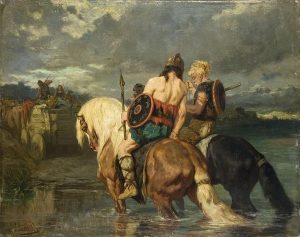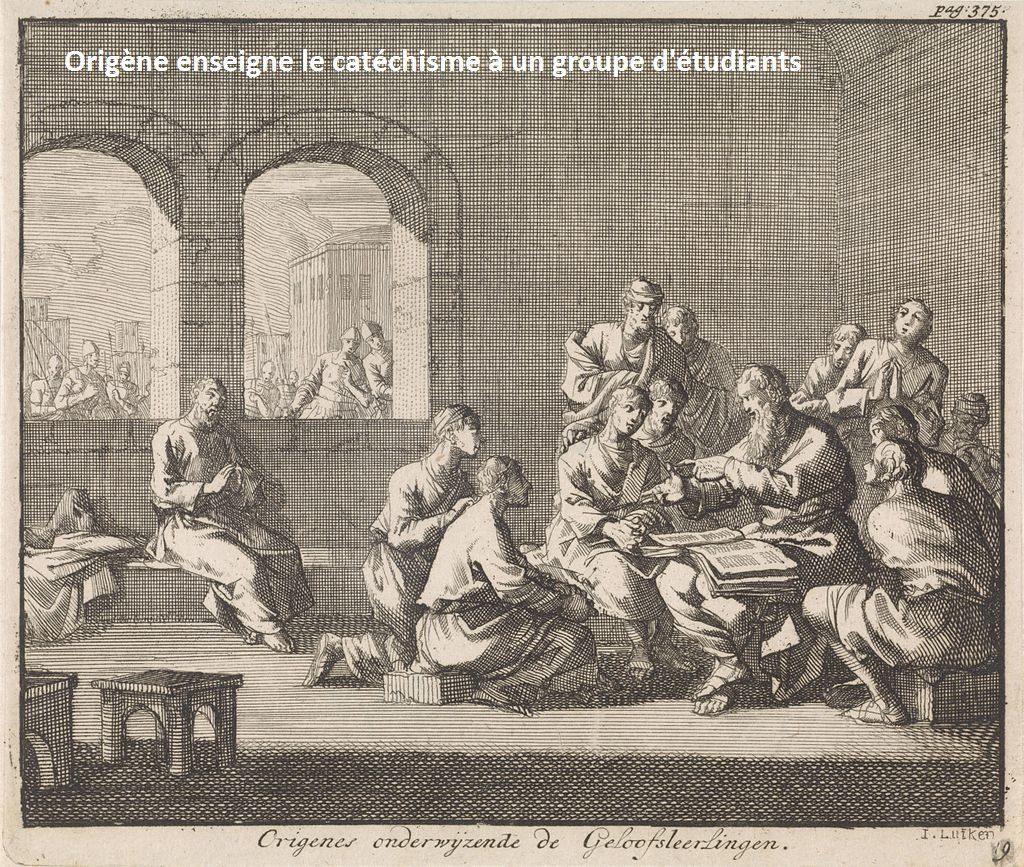
230 AD to 250 AD, Psalm 59: Gestation of Europe.
This site was first built in French (see www.147thgeneration.net). The English translation was mainly done using « google translation ». We have tried to correct the result of this translation to avoid interpretation errors. However, it is likely that there are unsatisfactory translations, do not hesitate to communicate them to us for correction.
(for that click on this paragraph)
Summary
This generation is from the years 230 AD to 250 AD.
According to our count, this generation is the 59th generation associated with Psalm 59. It is in this Psalm 59 that we therefore find an illustration of the facts of this generation.
After the death of Severus Alexander, a great period of political instability began in the Roman Empire resulting in more sustained attacks from the neighboring peoples of the empire. Rome, which had succeeded Athens, celebrated its thousand years, which in the Talmudic tradition corresponds to one day for the world: the day of Rome ends.
Rome will soon no longer be the center of the world. It is changing and those who knock on the door of the empire are the successors, those who will make the empire and be the masters of tomorrow: Europe, the West as we know it.
Indeed, while these people are waking up at the military level, the ideological ferment that will animate them is being born. Christian theology developed in this generation by confirming its break with Judaism.
Talk
« Barbarians »
After the death of Severus Alexander (222 AD – 235 AD), a great period of political instability began in the Roman Empire resulting in more sustained attacks from the neighboring peoples of the empire. Until then, the world was almost confined to a large Mediterranean area.
Rome, which had succeeded Athens, celebrated its thousand years, which in the Talmudic tradition corresponds to one day for the world: the day of Rome ends.

Rome will soon no longer be the center of the world. It is changing and those who knock on the door of the empire are the successors, those who will make the empire and be the masters of tomorrow: Europe, the West as we know it. In addition to the Moors of Africa and the Sassanids on the side of the East, in Europe, Rome suffered on the Danube the pressure of the Goths soon divided into Ostrogoths and Visigoths. Added to this are the Heruli, the Vandals, the Burgundians, the Alamanni and the Franks, mainly in the territories around the Rhine.
It is to these « barbarian » peoples who put in this generation the Roman Empire under pressure, that will face future generations of Jews, with ups and downs.
It is the beginning of this confrontation that the beginning of the Psalm evokes:

- For the conductor, al tashcheth; of David a michtam, when Saul sent and they guarded the house to slay him.
- Save me from my enemies, my God; strengthen me against those who rise up against me.
- Save me from workers of iniquity, and rescue me from bloodthirsty men.
- Although the Romans knew how to be bloodthirsty, the peoples who threaten the empire are at least as much and will accumulate far more unjust treatment to the Jews under their control than the Romans. The Romans had attacked the Jews as a vassal people, the future European powers would treat them as a fallen race without land.
- See how they lie in wait for me! Fierce men conspire against me for no offense or sin of mine, Lord.
- This passage is a good reflection of the situation in this generation where the « barbarian » ( « Fierce men« ) peoples are grouping themselves against the Roman Empire and this obviously concerns the Jews of the Empire. These peoples will constitute the Europe in which the Jews will find themselves in an increasingly difficult situation without this being associated with a faulty attitude towards these peoples.
- Without iniquity, they run and prepare themselves; awaken towards me and see.
- And You, O Lord, God of Hosts, God of Israel, arise to visit upon all the nations; be not gracious to any treacherous workers of iniquity forever.
- The peoples (« barbarians ») who are preparing to fight are heralding the coming fall of the Roman Empire in which the Jews, especially since the Edict of Caracalla, could be considered as full citizens. The history of Europe, which is announced for the Jews of Europe under the yoke of these new peoples, is not rosy. Thus in the fight to which he is preparing, there is not only the Roman Empire but also the Jews who will be fought unjustly, which justifies the punishment demanded by David, the psalmist.
The religious ferment
Indeed, while these people are waking up at the military level, the ideological ferment that will animate them is being born.

Since Justin (2nd century), Christian theology is developing and in this generation, Origen (185/251) actually initiates Christian exegesis:
- Without [1] Origen, there would be no theology. Everything starts with him because, thanks to him, philosophical reflection penetrates into Christianity. The great innovation brought by Origen is to have organized the theological thought into a logical and coherent system. From the faith passed on in the Church, the theologian could approach the great problems of human existence and provide answers in connection with a broad vision of the world. His influence was decisive, both in Greek and Latin theology. It also marked dogmatics, exegesis and spirituality. In God’s discourse he brought new formulas and new images; the study of the Bible became, thanks to him, a true science. His comments and homilies were read, recopied and used extensively, even by his detractors, Jerome, Ambrose of Milan, Augustine, those great exegetes of antiquity who took many ideas from their distant predecessor.
This philosophical birth of Christianity marks the final end of Judeo-Christianity, that is to say a Christianity that develops alongside Judaism, and, the real beginning of pagan-Christianity, a Christianity that develops by opposing to Judaism:
- The [2] Decalogue itself, which the Church recognizes as sustainable, represents the old covenant, whose repeal is signified by the destruction of the tables of the Law. This is already the interpretation of Barnabas. It is taken again by Origen. Moses, he says, showed us well before Saint Paul in what a poor opinion the letter of the Law should be kept. Having received the tablets of stone, he makes so few cases that he has thrown them and broken them, though they were written by the hand of God himself, and yet he has not been accused of impiety: his gesture clearly means that the virtue of the Law lies not in his letter, but in his mind.
As David says at the end of the psalm: « God is my fortress« , it is this fortress that the barbarians designated to this generation (those who will make Europe) will try to besiege the rest of the night.
This is the way to interpret the rest of the psalm:

- They return in the evening, they howl like a dog and encircle the city.
- Behold, they spew forth with their mouth; [they have] swords in their lips, for who hears?
- If the Romans fought the Jewish people militarily, the masters of tomorrow will not stop fighting him theologically. The reference to dogs reminds us that we are in the second watch of the night.
- But You, O Lord, will scoff at them; You will mock all the nations.
- [Because of] his strength, I hope for You, for God is my fortress.
- The God of my kindness will precede me; God will allow me to see in those who watch me.
- David renews his trust in God. It is this supernatural confidence that will allow the Jewish people to go through the night despite the formidable adversity they will have to endure.
- Do not kill them, lest my people forget; remove them from their possessions with Your power and bring them down, O Lord our Shield.
- The sin of their mouth is the word of their lips, and they will be seized because of their haughtiness, because of the curse and the lies that they tell.
- Destroy [them] with wrath so that they will be no longer, and they will know that God rules over Jacob to the ends of the earth forever.
- And they will return in the evening, they will howl like dogs, and they will encircle the city.
- They will roam about to eat if they are not sated, so that they will lodge.
- And I will sing of Your power, and I will sing praises of Your kindness in the morning, for You were my stronghold and a refuge on a day that I was in straits.
- My strength! To You will I sing for God is my stronghold, O God of my kindness.
- In spite of all the attacks of the future Christian Europe on the Jewish people, it will survive until the end of time (« in the morning »: the dawn) when the Jewish people will see its resurrection and thus be rewarded for their fidelity to God.

[1] Excerpt from Philippe Henne’s « Introduction to Origen » book (Éditions du Cerf website) (French: Extrait de la fiche livre Internet de « Introduction à Origène » de Philippe Henne (site des Éditions du Cerf) ).
[2] Marcel Simon / Verus Israel / The conflict of orthodoxies: « The anti-Jewish polemic, characters and methods » (French: « Vérus Israël »/Le conflit des orthodoxies : « La polémique anti-juive, caractères et méthodes » (p. 180) ).
